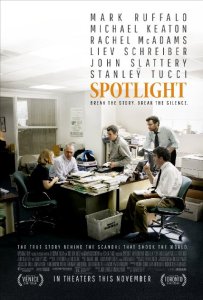As you may have heard, the makers of the Oscar-winning movie Spotlight have reached a settlement with Boston College spokesman Jack Dunn about his claim that the film depicts him in an unfavorable manner regarding the cover-up of the pedophile-priest scandal.
Spotlight tells the story of The Boston Globe‘s Pulitzer Prize-winning investigation that revealed that Cardinal Bernard Law, then the archbishop, was directly involved in reassigning priests who’d been accused of sexual abuse. The Dunn character is seen taking part in a meeting about a pedophile priest at Boston College High School.
The Associated Press reports on the settlement here; The New York Times covers it here; the Globe here; and the Boston Herald here.
As part of the settlement, the filmmakers acknowledge that the lines attributed to Dunn were “fabricated,” which is kind of odd when you think about it. Spotlight, of course, is a work of fiction, though based on true events. In that sense, every line in Spotlight is fabricated. The question is whether Dunn was portrayed in a manner that is fundamentally false.
The filmmakers have contended from the time Dunn went public with his complaints in a Globe column by Kevin Cullen that Dunn is not portrayed in a negative light—rather, that he comes across “as an alumnus and public-relations professional from an affiliated institution, was concerned about the reputation of BC High, and acted in concert with his affiliation and professional training,” as the filmmakers put it in a letter reported by the Globe last November. In the settlement, the filmmakers say:
As is the case with most movies based on historical events, ‘Spotlight’ contains fictionalized dialogue that was attributed to Mr. Dunn for dramatic effect. We acknowledge that Mr. Dunn was not part of the Archdiocesan cover-up.
From what I can tell, there’s nothing in the settlement that contradicts what the filmmakers said last November, or that calls into question the recollections of Globe reporters Walter Robinson and Sacha Pfeiffer, who were at the BC High meeting.
At the time that this controversy broke, I wrote a piece for WGBH News about the hazards of true-life movies that freely mix fact and fiction. I certainly don’t question the pain that Dunn says he experienced. From the beginning the dispute has struck me as a genuine disagreement between him and the filmmakers over how he comes across in the movie.
That said, I’ve only seen Spotlight once, and I’d like to see that scene again.


